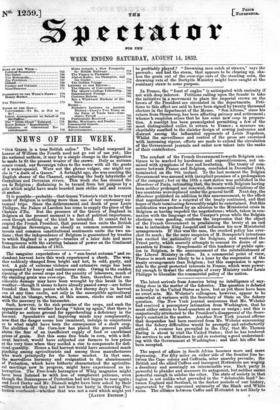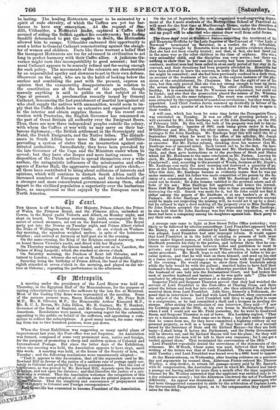The aspect of affairs in South Africa becomes more and
more depressing. For fifty miles on either side of the frontier line be- tween the Cape colony and Caffraria, utter anarchy prevails ; the British and the allied Caffres and insurgent Hottentots are waging a desultory and seemingly an interminable war. Each party is powerful to plunder and massacre its antagonist, but neither seems powerful enough to subdue the other. The state of society in that region is not unlike what prevailed in the " debateable land " be- tween England and Scotland, in the darker periods of our history, aggravated by the engrained animosity of the Black and White races. The alliance between Caffre and Hottentot is not likely to
be lasting. The leading Hottentots appear to be animated by a spirit of rude chivalry, of which the Caffres are yet too bar- barous to have any conception. At the request of Som- ali, Uithaalder, a Hottentot leader, captured a Caffre chief accused of aiding the British against his countrymen ; but finding Sandilli determined to put the captive to death, the Hottentots allowed him to escape. triths.alder embraced this opportunity to send a letter to General Cathcart remonstrating against the slaugh- ter of women and children. Facts like these warrant a belief that the insurgent Hottentots are too far advanced in civilization to act long in perfect harmony with their Caffre allies. A judicious Go- vernor might turn this incompatibility to good account ; but Ge- neral Cathcart appears to be scarcely refined and far-seeing enough for such policy. The movements of the colonists are characterized by an unparalleled apathy and slowness to act in their own defence. Observers on the spot, who are in the habit of looking below the surface and combining the past with the present, express an opinion that the exasperating disappointments in relation to the constitution are at the bottom of this apathy, though scarcely anything is said in public on that subject at the Cape at present. A proclamation recently issued by General Cathcart, denouncing the last punishment of martial law against all who shall supply the natives with ammunition, would seem to im- ply that the Caffre chiefs have an extensive and organized agency in the interior and obtain supplies thence. By his recent con- vention with Prtetorius, the English Governor has renounced on the part of Great Britain all authority over the Emigrant Boors. Thus, there are now three independent peoples outside the colony, with whom the Caffres at war with us may carry on their bar- barous diplomacy,—the British settlement in the Sovereignty and Natal, the DutclaEmigrants, and the Native tribes. The disturb- ances in South Africa have more the character of hostilities pervading a system of states than an insurrection against con- stituted authorities. Immediately, they have been provoked by the late Governor of the Cape and the Ministers under whom he served; but they have also deeper and more lasting causes. The disposition of the Dutch settlers to spread themselves over a wide surface, the antagonistic influences of the missionaries and other agents of Exeter Hall, the aggressive ambition of native chiefs,— all these have contributed to bring about collisions of interests and ?pinions, which will continue to disturb South Africa until the increased numbers of European settlers, and the introduction of a stronger and more concentrated government among them, shall impart to the civilized population a superiority over the barbarians there, as unequivocal as that enjoyed by the European race in North America.



























 Previous page
Previous page